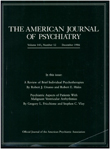The dexamethasone suppression test in adolescent psychiatric inpatients
Abstract
The dexamethasone suppression test (DST) was administered to 120 adolescent psychiatric patients at the time of hospitalization, and cortisol levels were measured at 4:00 p.m. and 11:30 p.m. on the day after a 1-mg oral dose of dexamethasone was given. Failure to suppress serum cortisol (i.e., cortisol level less than 5 micrograms/dl) was noted in 25 patients: 7 of 17 patients who met DSM-III criteria for major depressive disorder, 7 of 38 patients with dysthymic disorder, 7 of 47 patients with conduct disorder, and 4 of 15 schizophreniform patients. The predictive value of the DST for major depressive disorder was only 28%. Although adolescent patients with abnormal DSTs may eventually develop affective symptoms consistent with a major depressive disorder, the DST did not discriminate between major depression and other psychiatric diagnoses in these hospitalized adolescents.
Access content
To read the fulltext, please use one of the options below to sign in or purchase access.- Personal login
- Institutional Login
- Sign in via OpenAthens
- Register for access
-
Please login/register if you wish to pair your device and check access availability.
Not a subscriber?
PsychiatryOnline subscription options offer access to the DSM-5 library, books, journals, CME, and patient resources. This all-in-one virtual library provides psychiatrists and mental health professionals with key resources for diagnosis, treatment, research, and professional development.
Need more help? PsychiatryOnline Customer Service may be reached by emailing [email protected] or by calling 800-368-5777 (in the U.S.) or 703-907-7322 (outside the U.S.).



